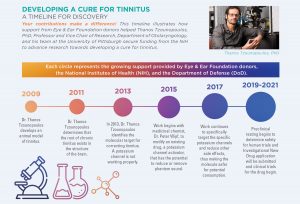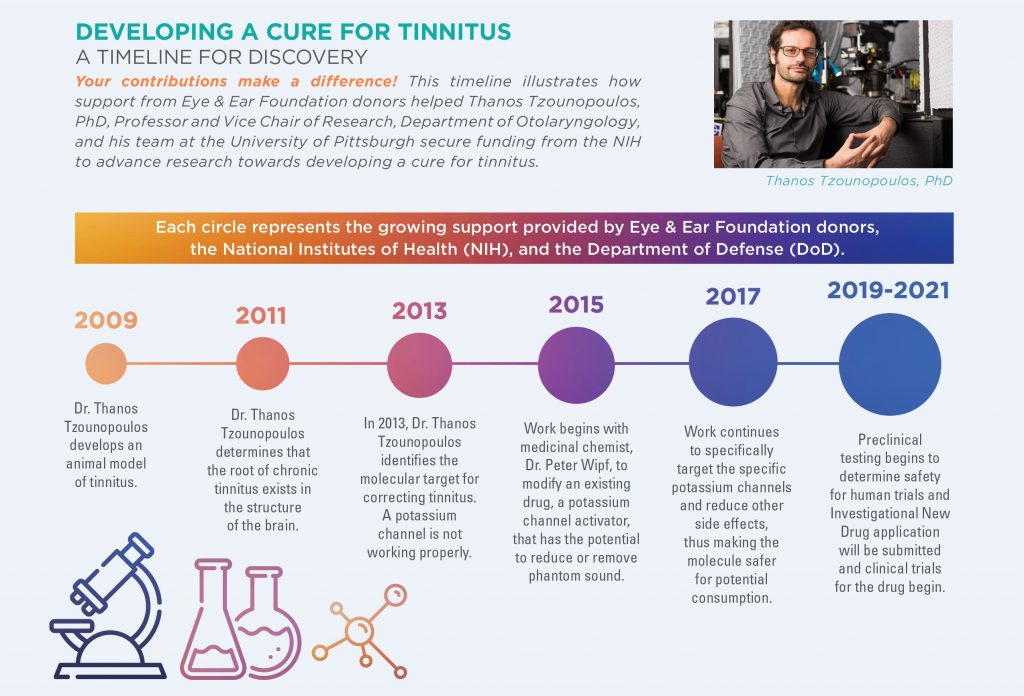- What is tinnitus? What causes it?
- What treatments are available?
- Is there a cure?
- How do I find a doctor?
- Ask the Scientist
What is tinnitus? What causes it?
Tinnitus is a condition that affects 10%-20% of the population in the United States. It is characterized by sounds in the ear or ears that are not related to external sounds and is sometimes referred to as a phantom sound or noise.
Recently, Dr. Thanos Tzounopoulos, Endowed Professor, Vice Chair of Research in the Department of Otolaryngology at the University of Pittsburgh and the Director of the newly formed Pittsburgh Hearing Research Center was able to identify that the source of tinnitus is in the brain and not the ear. This has helped to research ways to recognize and search for a cure for this disease.
What treatments are available?
The Tinnitus Treatment Program at UPMC’s Center for Audiology recommends the first step of treatment as a medical and audiological evaluation. This may include a complete general physical exam, an ear, nose, and throat exam, and a review of your medical history.
An audiologist may also perform an array of tests to provide information about your tinnitus, hearing, and decreased sound tolerance, which may include:
- Comprehensive audiometry
- Assessment of tinnitus
- Speech & pure tone tolerance levels
- Otoacoustic emissions
Is there a cure?
Typically, treatment plans such as those offered by UPMC’s Tinnitus Treatment Program involve a combination of education/counseling and the use of low-level sounds provided by noise generating devices, hearing aids, or environmental sounds. The goal of this treatment is to help people manage their reactions to bothersome tinnitus. It is not a medical treatment or cure.
Dr. Thanos Tzounopoulos, Director of the Pittsburgh Hearing Research Center, was able to identify that the source of tinnitus is in the brain and not the ear. In 2013, Dr. Tzounopoulos identified the molecular target for correcting tinnitus: a potassium channel that is not working properly. Working with medicinal chemist Dr. Peter Wipf, Dr. Tzounopoulous’ team modified an existing drug, a potassium channel activator, to develop a therapy with the potential to reduce or remove phantom sound.
After years of refining the drug to target the specific potassium channels associated with tinnitus and reducing side effects, the therapy is now undergoing preclinical testing to determine safety for human trials, where upon the Investigational New Drug application will be submitted and clinical trials will begin.

For the latest news on tinnitus research, subscribe to EEF’s Monthly Newsletter.
How do I find a doctor?
To receive proper care, it is recommended that you schedule an appointment with an Audiologist. If you live in the Pittsburgh area or in Western Pennsylvania, you may consider the Tinnitus Treatment Program at UPMC’s Center for Audiology. Otherwise, you should ask for a referral from your Primary Care Physician or utilize the physician search tool provided by your healthcare insurance company.
Ask the Scientist
Have a question about tinnitus for a scientist at the University of Pittsburgh? Email the Eye & Ear Foundation at askthescientist@eyeandear.org with your question and we’ll do our best to answer it for you.
To support Dr. Tzounopoulos’ groundbreaking research on tinnitus treatments, make a donation to the Eye & Ear Foundation.